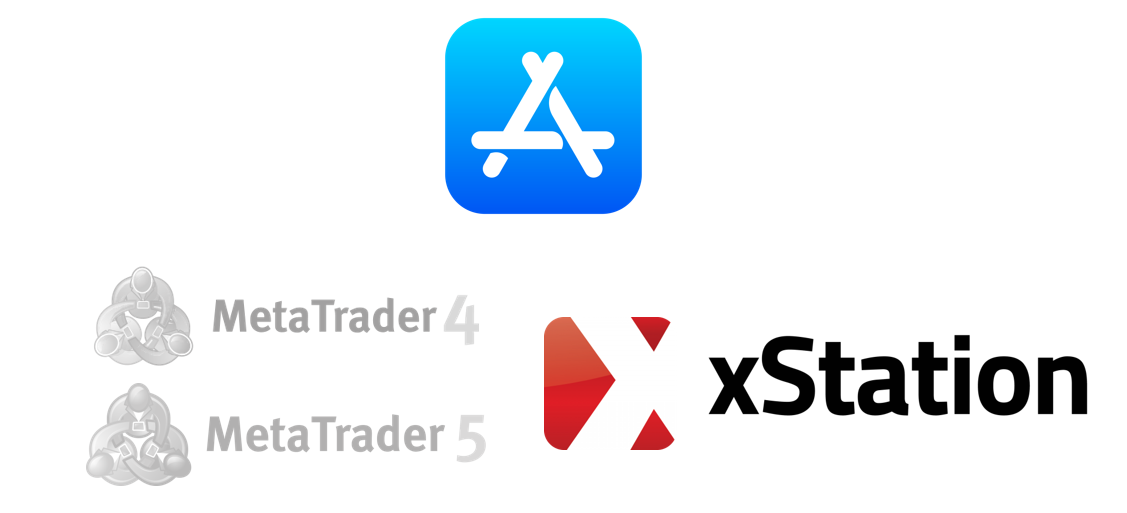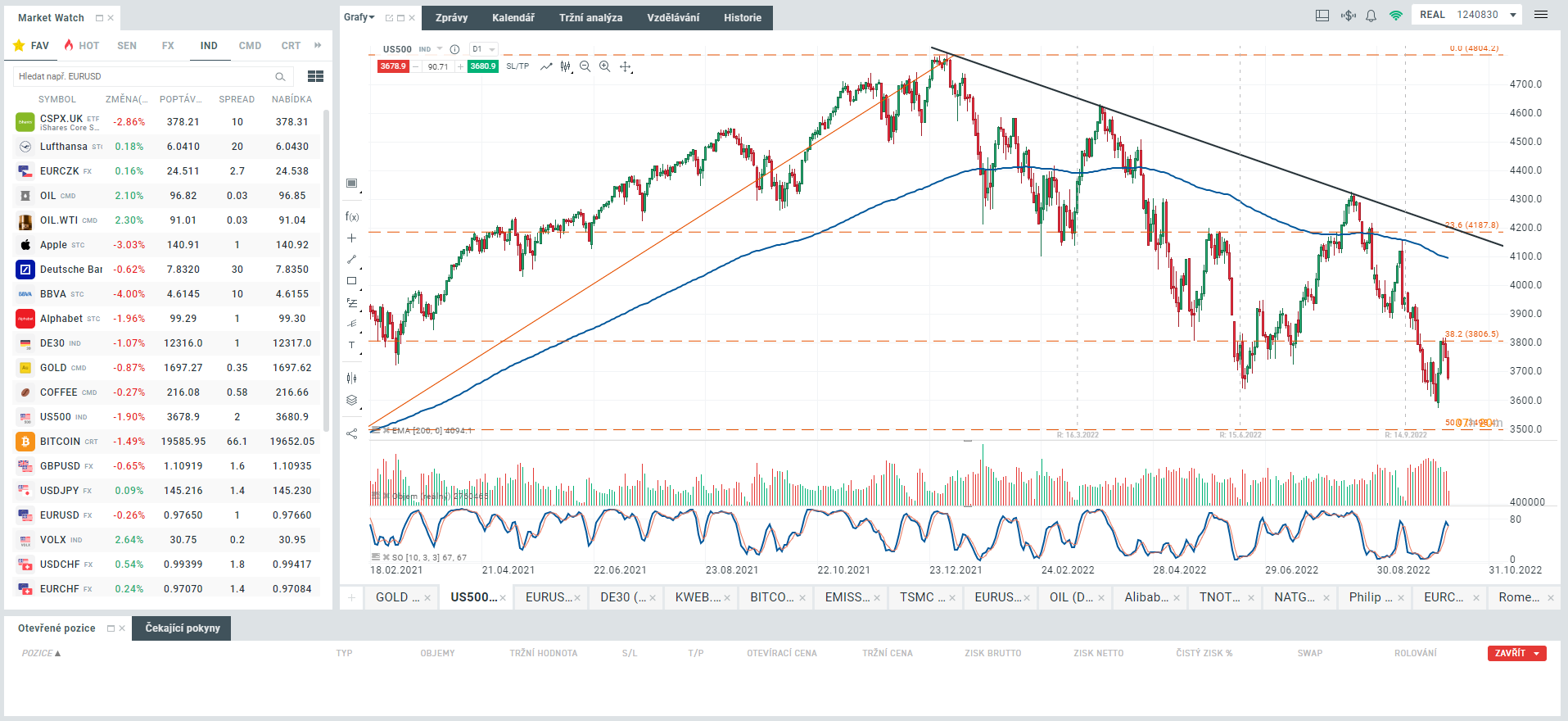We bring you an interesting interview with Vladimír Holovka, XTB's business director for the Czech Republic, Slovakia and Hungary, regarding the possible end of MetaTrader 4, under which Apple, among others, signs.
XTB was one of the first brokers to offer the MetaTrader 4 platform on the Czech market. Why are you gradually abandoning this platform now?
Historically, several circumstances led us to this. Sometime around 2014, there was a risk that the creator of the MetaTrader 4 platform, MetaQuotes, could strategically merge with one of the largest FX brokers at the time, Alpari. Both companies were of Russian origin, the owners were also said to be close to each other, and at the time Alpari had a significant part of the market share. So we took seriously the risk that some key merger would occur and MetaQuotes would proceed to stop providing MT4 for other brokers, which would be liquidating for the vast majority of the smaller ones.
But it didn't happen, did it?
These rumors then stopped, and in addition, broker Alpari ended up insolvent after the Swiss franc was freed in 2015, which effectively caused the broker's demise. However, we had already developed the first version of our own xStation platform.
In recent days, MT4 has been much discussed in connection with the removal of its mobile version from the AppStore. Are the circumstances of this move already known and has it affected XTB clients in any way?
Fortunately, it had minimal impact on our clients. Our trade volumes that we implement via MT4 are already in percentage units. We have not been providing the MT4 platform for new clients for almost a year now, and existing clients are slowly transitioning to our main xStation platform. Since the removal of the MT4 mobile application from the AppStore is a handicap for new users who want to download this application now, those XTB clients who have used MT4 until now probably already have the mobile version installed on their Apple phones and it will remain on their devices for the time being. There is still confusion regarding the reasons for removing the application from the AppStore. I haven't seen an official statement yet, but there have been speculations that the takedown is related to the Russian origins of MetaQuotes, or that the MT4 platform was connected to some larger financial scam by one entity using the platform. There has also been speculation that the originally Russian company MetaQuotes may be helping to circumvent sanctions and thus help funnel funds out of Russia to friendly oligarchs there. I can't confirm any of these versions for myself, but we'll see if Google Play will take a similar step, or if MT4 will even return to the AppStore. In that case, I would probably reject the removal in connection with the violation of anti-Russian sanctions, and I would see the probable cause more in the fact that in this regulated environment of financial services MetaQuotes needs to choose its clients better, so that there are no fraudulent structures among them.
Could these events not encourage some clients to move away from MT4?
Undoubtedly yes, although custom is an iron shirt, but we must remember that this platform first saw the light of day back in 2004, almost 20 years ago. Interestingly, this was at a time when Windows XP was in use. I remember how PC users didn't want to switch to the newer Windows 7 and then 10 after that, but the development is relentless and everyone is used to the new Windows enough to not even remember XP. I personally also grew up on MT4, so it was not easy for me to primarily move to another one, but it's like someone still insisting on using the old Nokia with a black and white display. Although you can also make phone calls on it, modern smart phones are capable of many times more functions both in the foreground and in the background. By the way, some MT4 support from MetaQuotes definitely ended sometime in 2019, so even the developer himself would like to slowly end the operation of this platform.
So why is the use of MT4 not over yet?
MT4 was a phenomenon in its day, no doubt about it. This happened because it was the first major trading platform for which the end user did not have to pay. Until then, it was quite common for the investor to pay monthly fees for renting the platform, for historical data, for current data and many other fees that made trading itself a relatively expensive affair. With the advent of MT4, this system changed to the fact that the broker paid for its use for its clients and still pays today. A full-fledged demo version was available, and with its simplicity, MT4 stood out against the platforms of the time. Another important factor was the simple MQL programming language and the possibility to test the programmed strategies relatively easily. This positive led to a mass expansion and thus a relatively large database of freely available as well as paid programmed additions to the platform in the form of indicators, scripts or automatic strategies. What became a success became a disaster at the same time. The community around MT4 has grown to such a size that as soon as MetaQuotes came out with a new version of MetaTrader 2010 in 5, which was not fully compatible with MT4, everyone was reluctant to switch to this new version. Therefore, brokers, developers and, of course, traders naturally stayed with MT4, which increasingly did not comply with some new regulatory regulations. Therefore, brokers often have to find ways of different alternative solutions in order to comply with European regulation in particular, because MetaQuotes does not intend to modify MT4 in any way, even though the volume of trades on MT4 is estimated to be up to 5 times larger than on MT5. However, from my point of view, this is prolonging the inevitable end.
So what are the alternatives to MT4?
Naturally, MT5 is offered, but since Apple also removed the mobile version of MT5 from its AppStore, the investor cannot be sure even with this variant. A broker always chooses between adopting a third-party solution or developing its own solution. The trend of recent years, especially among large brokers, is to build their own platforms, which is extremely demanding for developers, both in terms of quality know-how and time. However, it gives brokers a lot of flexibility if you need to implement some new regulatory measures quickly, but above all, you can develop the platform according to what your clients need. As I have already mentioned, XTB has taken this path and I am glad that the XTB platform appeared in an international survey among the TOP 4 best alternatives to the MetaTrader platform. We were even the first in the world to obtain the ISO 27000 certificate with our platform, which defines the highest standards in the areas of information security management, processes and information trust. Our ambition is not to have the most sophisticated application for analysis and trading, but to have the best balanced simplicity of control with factors such as functionality, clarity and having all the necessary data and information in one place. Last but not least is the instruction execution speed, which we manage to consistently reduce and are currently somewhere down to 8 milliseconds, which is amazing.
In conclusion, what would you advise when choosing a trading platform?
Above all, the platform is always connected to a broker, so first of all you should always thoroughly check whether the given broker has all the necessary permits and licenses. If I had to advise on the choice of a platform, it is quite common that you can test each platform on a demo account to try the controls, work with charts and trades without the risk of losing capital. I would definitely recommend trying the mobile version now, as the use of mobile applications is becoming more and more common. I would also consider whether to look for a so-called multi-asset platform, or one in which you can invest and manage more types of investment assets than just one, for example just forex or just stocks. On the other hand, I would always be smarter if the investment application seems to be too elementary and should be more interested in colorful graphs and various elements of gamification in which the platform rewards you for every action, rather than focusing on the functionality of the investment process and not covering the risks that investing carries. Investing or trading should not be a game, but a serious activity for the appreciation of your capital. Since the financial sector is always burdened with greater regulation towards small investors, if the given application does not reflect this, it is a warning sign that something may be wrong.
If you haven't tried the XTB platform yet, you can try it on a demo account here: https://www.xtb.com/cz/demo-ucet.

